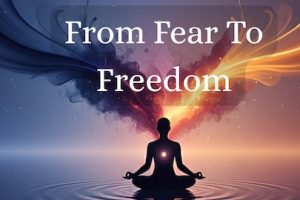A lot of seekers ask me – what is right action?
Life is full of situations which demand actions. We have to respond to situations, and respond correctly. But a seeker is always second guessing his or her actions – should I accept and be compassionate or should I take action which might lead to confrontations? We try hard to accept, to be compassionate, while being at war with our inner emotions.
A simple example would be an annoying neighbor who plays loud music all the time. Should I accept the situation and do nothing? Or should I ask the neighbor to be considerate and stop playing the music. Wouldn’t that mean that I am not accepting the situation?
The problem is that we are looking at the action in a completely wrong way. There is so much emphasis on the action itself that we totally ignore the space from which action arises. The space from where the action arises is more important than the action itself. All the while you have been focusing on actions themselves. What should I do? How should I tackle this? But have you paid attention to the space from which action originates? By space I mean the state of consciousness the person is in.
In the above example of the annoying neighbor who plays loud music, there is a wide spectrum of actions you can take, from being completely passive and accepting to the opposite spectrum of getting into a confrontation. In between these two extremes, there is a range of choices. You can politely talk to him or invite him home over dinner to discuss the issue. So there can be endless number of approaches and each can lead to different actions. There are far too many dynamics at play here.

Let’s go a little deeper into understanding the space from where action arises. The seeker has been told, accept the situation, bear it, have no emotional reaction to it. But there is an emotional reaction of irritation and frustration. So the seeker tries to accept the situation, but a part of him/her is upset and sooner or later, the acceptance will give way to anger, annoyance and resentment.
You have to understand that an action has 2 parts. The first part is the external stimulus, which is the loud music. The second part is your reaction to it. Why isn’t acceptance working? The reason is because we are just accepting the first part, the external stimulus. We are not accepting our reaction to it. Instead of accepting and understanding the anger and frustration, we are trying to repress it. Please understand this. There can be no partial acceptance of a situation. The situation comprises of both, the external stimulus as well as the inner emotions of anger and frustrations which arises. You have to accept both. You have to totally accept your anger, your frustration; you wanting the music to stop. You cannot repress it with superficial acceptance. Sooner or later, the superficial acceptance will wear out and the mind will revolt, and you will find yourself resenting.
You have to accept the whole movement which arises at that moment. You understand this total movement; the external noise invoking the inner anger in you. Without the noise, there wouldn’t be any of these emotions arising. You accept this entire movement, this entire wave as one. You need to see this whole movement in totality, not in parts, not in fragments. And you observe this whole movement, you watch it arise, you accept it totally. This very watching and accepting of the whole movement transforms the space from which actions arise. The inner space is no more reactive, repressed, wanting this or that. The inner space sees the whole movement and takes the right action. The action which will originate from this space of total acceptance will be an intelligent action. It will not be a reaction to a situation. And at that moment the transformation happens. You shift into being an observer; you shift into the witnessing stage. You are no more a part of the content which is being played out. From that state of observing, the right action happens.
And at that moment depending on the situation and the dynamics of it, you might just go and ask the neighbor to stop the music or you might ignore it. Both are valid responses.
The action which arises from total acceptance is spontaneous correct action. It is like touching something hot and spontaneously removing your hand. Similarly, you will experience action happens with no more thoughts, no more projections. You just go and do it and the entire movement ends. There is completion. You don’t second guess your action, you don’t try to be compassionate or accepting or angry or revengeful.
Life does come up with all sorts of challenges. There is no guidebook to tell you what actions to take. The common approach which religions or even certain paths take is to give out a set of rules and base all your actions around them. Life is way too rich to have static set of rules. But if the actions arise from the space of observation and total acceptance of the movement, you automatically solve the question of right actions.


4 Responses
” I believe it was J. Krishnamurti who said “” Eat meat or don’t eat meat, but just get on with it.”” Even vegetables have life. If I say the core of spirituality is non-violence, but I have to kill something to survive, then I have set myself up for internal conflict between an idea, a conclusion that I have accepted from someone else, and the behavior I have to control as a result.
What K was pointing out was the importance of reaching the state in which right actions happen by themselves. Getting on with it means spend time instead to examine and understand yourself, why your mind is in conflict. With that understanding comes a state in which all responses are correct without any conscious effort on our part.
Other wise we are always caught in a web of self-deceit , self- aggrandizement, self- importance, all the domain of the ego, which never frees us from judgement, condemnation, upsets, fear, which maintains conflict and suffering.”
Great Insights. i never thought of it in these lines.
I can feel the immense love you have for spiritual seekers. It is rare to find someone with such clarity on various aspects of the mind, consciousness and meditation. Action is the touchstone of our everyday life. You are right that we need to go deeper into the very space from which actions arise.
Your words remind me of the great mystic J krishnamurti. You have similar clear insights like JK.
Very Eloquent !
The practice of mindfulness is a great tool to keep our awareness of the present moment . This gives us a calm, centered, and aware mind that doesn’t allow our mental processes to spiral.
It’s easy to get caught up in your thoughts and feelings. A great tip for staying mindful is to be mindful of your breath. Your mind is your home. Your mind is a place you can spend time with and not feel overwhelmed by.